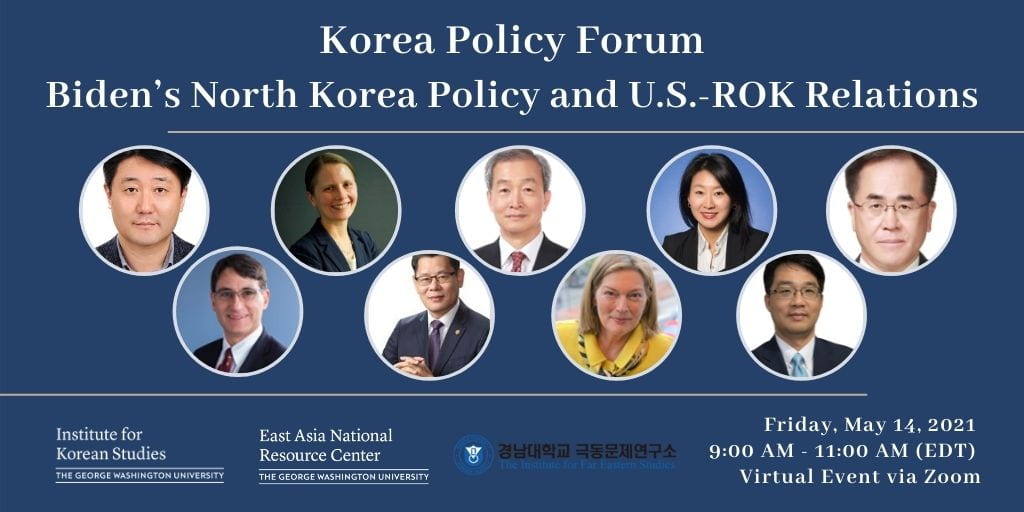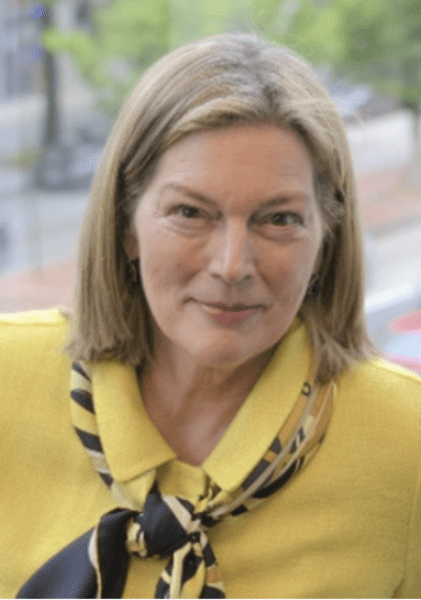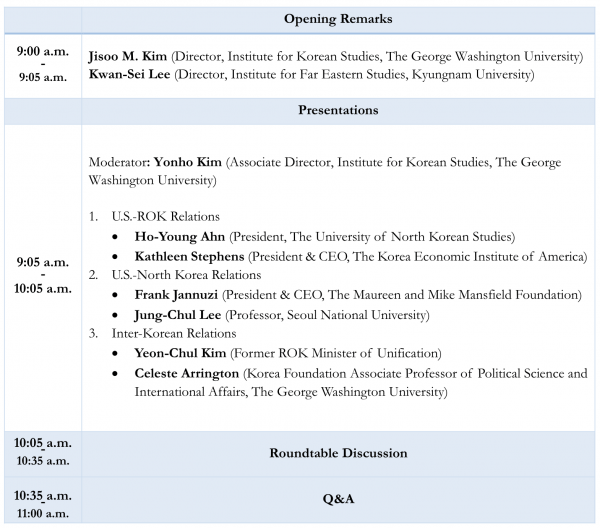
Korea Policy Forum
Friday, May 14, 2021
9:00 AM – 11:00 AM EDT
Virtual Event
This event is on the record and open to the public.
The event will be recorded and made available on GWIKS’ YouTube channel.
Event Description
President Joe Biden affirmed his intention to work closely with U.S. allies to address threats from North Korea through diplomacy and deterrence in his first address to a joint session of Congress. On the third anniversary of the signing of the Panmunjom Declaration with North Korean leader Kim Jung-Un, President Moon Jae-In urged for a resumption of the otherwise stalled Korean peninsula peace process, including restoring the inter-Korean dialogue. The upcoming U.S.-ROK summit on May 21 may represent a key milestone in the development of a new coordinated approach between the United States and South Korea to address issues related to North Korea. Please join the GW Institute for Korean Studies for an online discussion with experts who will be discussing views from the United States and South Korea on the Biden administration’s approach to the Korean peninsula and the state of U.S.-ROK relations.
Speakers
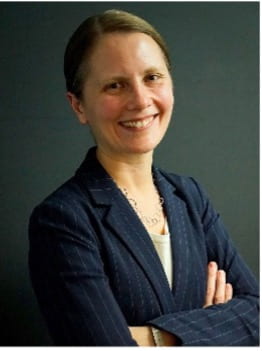 Celeste Arrington is Korea Foundation Associate Professor of Political Science and International Affairs at GW. She specializes in comparative politics, with a regional focus on the Koreas and Japan. Her research and teaching focus on law and social movements, the media, lawyers, policy processes, historical justice, North Korean human rights, and qualitative methods. She is also interested in the international relations and security of Northeast Asia and transnational activism. She is the author of Accidental Activists: Victim Movements and Governmental Accountability in Japan and South Korea (2016) and has published in Comparative Political Studies, Law & Society Review, Journal of East Asian Studies, Pacific Affairs, Asian Survey, and theWashington Post, among others. She received a Ph.D. from the University of California, Berkeley, an MPhil from the University of Cambridge, and an A.B. from Princeton University. She is currently writing a book that analyzes the role of lawyers and legal activism in Japanese and Korean policies related to persons with disabilities and tobacco control.
Celeste Arrington is Korea Foundation Associate Professor of Political Science and International Affairs at GW. She specializes in comparative politics, with a regional focus on the Koreas and Japan. Her research and teaching focus on law and social movements, the media, lawyers, policy processes, historical justice, North Korean human rights, and qualitative methods. She is also interested in the international relations and security of Northeast Asia and transnational activism. She is the author of Accidental Activists: Victim Movements and Governmental Accountability in Japan and South Korea (2016) and has published in Comparative Political Studies, Law & Society Review, Journal of East Asian Studies, Pacific Affairs, Asian Survey, and theWashington Post, among others. She received a Ph.D. from the University of California, Berkeley, an MPhil from the University of Cambridge, and an A.B. from Princeton University. She is currently writing a book that analyzes the role of lawyers and legal activism in Japanese and Korean policies related to persons with disabilities and tobacco control.
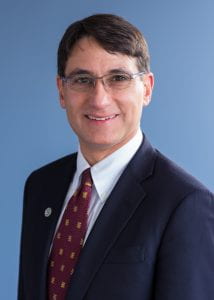 Frank Jannuzi joined the Mansfield Foundation as President and Chief Executive Officer in April 2014. He previously served as Deputy Executive Director (Advocacy, Policy and Research) at Amnesty International, USA. There he shaped and promoted legislation and policies to advance universal human rights, protect individuals and communities at risk, and free prisoners of conscience. From 1997-2012 Mr. Jannuzi was Policy Director, East Asian and Pacific Affairs, for the U.S. Senate Foreign Relations Committee, where he advised Committee Chairmen Joseph Biden and John Kerry on a range of security, political, economic, and human rights issues pertinent to U.S. relations with East Asia. During his tenure with the Foreign Relations Committee he also was a Hitachi Fellow of the Council on Foreign Relations from 2006-2007, serving as a visiting lecturer at Keio University and a visiting scholar at the Institute of International Policy Studies in Tokyo. Early in his career he served for nine years as an analyst in the U.S. Department of State’s Bureau of Intelligence and Research. Mr. Jannuzi holds a Bachelor of Arts degree from Yale University and Master in Public Policy degree from the John F. Kennedy School of Government, Harvard University. He has traveled throughout Asia and has written extensively on East Asia policy issues, including U.S. relations with Japan, China, and North Korea.
Frank Jannuzi joined the Mansfield Foundation as President and Chief Executive Officer in April 2014. He previously served as Deputy Executive Director (Advocacy, Policy and Research) at Amnesty International, USA. There he shaped and promoted legislation and policies to advance universal human rights, protect individuals and communities at risk, and free prisoners of conscience. From 1997-2012 Mr. Jannuzi was Policy Director, East Asian and Pacific Affairs, for the U.S. Senate Foreign Relations Committee, where he advised Committee Chairmen Joseph Biden and John Kerry on a range of security, political, economic, and human rights issues pertinent to U.S. relations with East Asia. During his tenure with the Foreign Relations Committee he also was a Hitachi Fellow of the Council on Foreign Relations from 2006-2007, serving as a visiting lecturer at Keio University and a visiting scholar at the Institute of International Policy Studies in Tokyo. Early in his career he served for nine years as an analyst in the U.S. Department of State’s Bureau of Intelligence and Research. Mr. Jannuzi holds a Bachelor of Arts degree from Yale University and Master in Public Policy degree from the John F. Kennedy School of Government, Harvard University. He has traveled throughout Asia and has written extensively on East Asia policy issues, including U.S. relations with Japan, China, and North Korea.
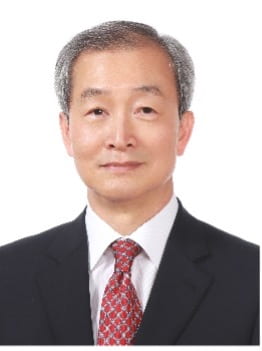 Ho-Young Ahn is the President of the University of North Korean Studies, a premier institution for research and education on North Korea related issues. Ambassador Ahn served as the Republic of Korea’s Ambassador to the United States (2013-17), Deputy Minister for Trade at the Ministry of Foreign Affairs, Ambassador to the European Union and Belgium, and the First Vice Foreign Minister. Ambassador Ahn studied international relations and law at Seoul National University (BA), Georgetown University (MS), Korea National Open University (LLB) and the Georgetown Law School (LLM). He received a Ph.D degree (Hon) in political science from Kyung-Nam University.
Ho-Young Ahn is the President of the University of North Korean Studies, a premier institution for research and education on North Korea related issues. Ambassador Ahn served as the Republic of Korea’s Ambassador to the United States (2013-17), Deputy Minister for Trade at the Ministry of Foreign Affairs, Ambassador to the European Union and Belgium, and the First Vice Foreign Minister. Ambassador Ahn studied international relations and law at Seoul National University (BA), Georgetown University (MS), Korea National Open University (LLB) and the Georgetown Law School (LLM). He received a Ph.D degree (Hon) in political science from Kyung-Nam University.
 Jisoo M. Kim is Korea Foundation Associate Professor of History, International Affairs, and East Asian Languages and Literatures. She currently serves as the Director of the Institute for Korean Studies and the Co-Director of the East Asia National Resource Center at GW. She also serves as the Editor-in-Chief of the Journal of Korean Studies. She is a specialist in gender, law, and emotions in Korean history. Her broader research interests include gender and sexuality, crime and justice, forensic medicine, literary representations of the law, history of emotions, vernacular, and gender writing. She is the author of The Emotions of Justice: Gender, Status, and Legal Performance in Chosŏn Korea (University of Washington Press, 2015), which was awarded the 2017 James Palais Prize of the Association for Asian Studies. She is also the co-editor of The Great East Asian War and the Birth of the Korean Nation by JaHyun Kim Haboush (Columbia University Press, 2016). She is currently working on a book project tentatively entitled Sexual Desire, Crime, and Gendered Subjects: A History of Adultery Law in Korea. She received her M.A., M.Phil., and Ph.D. in East Asian Languages and Cultures from Columbia University.
Jisoo M. Kim is Korea Foundation Associate Professor of History, International Affairs, and East Asian Languages and Literatures. She currently serves as the Director of the Institute for Korean Studies and the Co-Director of the East Asia National Resource Center at GW. She also serves as the Editor-in-Chief of the Journal of Korean Studies. She is a specialist in gender, law, and emotions in Korean history. Her broader research interests include gender and sexuality, crime and justice, forensic medicine, literary representations of the law, history of emotions, vernacular, and gender writing. She is the author of The Emotions of Justice: Gender, Status, and Legal Performance in Chosŏn Korea (University of Washington Press, 2015), which was awarded the 2017 James Palais Prize of the Association for Asian Studies. She is also the co-editor of The Great East Asian War and the Birth of the Korean Nation by JaHyun Kim Haboush (Columbia University Press, 2016). She is currently working on a book project tentatively entitled Sexual Desire, Crime, and Gendered Subjects: A History of Adultery Law in Korea. She received her M.A., M.Phil., and Ph.D. in East Asian Languages and Cultures from Columbia University.
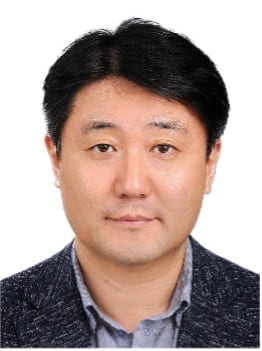 Jung-Chul Lee is a Professor in the Department of Political Science and International Relations at Seoul National University. He was a Professor in the Department of Political Science and International Relations at Soongsil University (2006-2021) and the Chief of Economic Security Research Team at the Samsung Economic Research Institute (2002-2006). In 2014 he served as a visiting scholar at the George Washington University’s Sigur Center for Asian Studies. He has written many books and articles on North Korea, including “Sanctions for Nuclear Inhibition: Comparing Sanction Conditions between Iran and North Korea”(Asian Perspective, 2019), “Costly Signals, Failed Deterrence and a New Alternative”(Legislative Studies in Korean, 2017), “Obama Doctrine and US Policy towards North Korea: Geopolitics, Nuclear Strategy, and Value iplomacy,” (Journal of Korean Politics in Korean, 2016) and “Making Sense of North Korea: How to Respond to Pyongyang’s Charm Offensive,”(Foreign Affairs, 2015). He holds a Bachelor of Laws degree (1991) from Seoul National University and an M.A. (1997) in Political Science from Seoul National University. He completed his Ph.D. in Political Science at Seoul National University in 2002.
Jung-Chul Lee is a Professor in the Department of Political Science and International Relations at Seoul National University. He was a Professor in the Department of Political Science and International Relations at Soongsil University (2006-2021) and the Chief of Economic Security Research Team at the Samsung Economic Research Institute (2002-2006). In 2014 he served as a visiting scholar at the George Washington University’s Sigur Center for Asian Studies. He has written many books and articles on North Korea, including “Sanctions for Nuclear Inhibition: Comparing Sanction Conditions between Iran and North Korea”(Asian Perspective, 2019), “Costly Signals, Failed Deterrence and a New Alternative”(Legislative Studies in Korean, 2017), “Obama Doctrine and US Policy towards North Korea: Geopolitics, Nuclear Strategy, and Value iplomacy,” (Journal of Korean Politics in Korean, 2016) and “Making Sense of North Korea: How to Respond to Pyongyang’s Charm Offensive,”(Foreign Affairs, 2015). He holds a Bachelor of Laws degree (1991) from Seoul National University and an M.A. (1997) in Political Science from Seoul National University. He completed his Ph.D. in Political Science at Seoul National University in 2002.
Kathleen Stephens is the President and CEO of the Korea Economic Institute of America (KEI). A former U.S. Foreign Service Officer, she served as U.S. Ambassador to the Republic of Korea from 2008 to 2011. Her other overseas assignments included postings to China, former Yugoslavia, Portugal, Northern Ireland, where she was U.S. Consul General in Belfast during the negotiations culminating in the 1998 Good Friday Agreement, and India, where she was U.S. Charge ‘d Affaires (2014-2015). Ambassador Stephens also served in a number of policy positions in Washington at the Department of State and the White House. These included acting Under Secretary of State for Public Diplomacy and Public Affairs (2012), Principal Deputy Assistant Secretary of State for East Asian and Pacific Affairs (2005-2007), Deputy Assistant Secretary of State for European and Eurasian Affairs (2003-2005), and National Security Council Director for European Affairs at the Clinton White House.
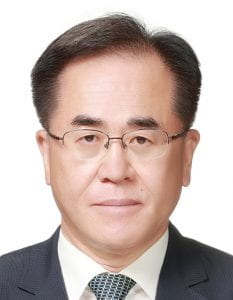 Kwan-sei Lee is the Director of the Institute for Far Eastern Studies at Kyungnam University. He has served in a number of positions at the ROK Ministry of Unification. These included the 17th Deputy Minister of Unification, Head of the Office of Inter-Korean Dialogue, Director General for Unification Policy, Head of the Intelligence and Analysis Bureau, and the Ministry’s spokesperson. He also served as a representative in the 18th, 19th, and 20th Inter-Korean Ministerial Talks, and was the head of the advance team for the Inter-Korean Summit. He is a member of various governmental advisory committees such as the Gaeseong Industrial District Management Foundation. He received his Ph. D. in North Korean Studies from the Graduate School of North Korean Studies at Kyungnam University.
Kwan-sei Lee is the Director of the Institute for Far Eastern Studies at Kyungnam University. He has served in a number of positions at the ROK Ministry of Unification. These included the 17th Deputy Minister of Unification, Head of the Office of Inter-Korean Dialogue, Director General for Unification Policy, Head of the Intelligence and Analysis Bureau, and the Ministry’s spokesperson. He also served as a representative in the 18th, 19th, and 20th Inter-Korean Ministerial Talks, and was the head of the advance team for the Inter-Korean Summit. He is a member of various governmental advisory committees such as the Gaeseong Industrial District Management Foundation. He received his Ph. D. in North Korean Studies from the Graduate School of North Korean Studies at Kyungnam University.
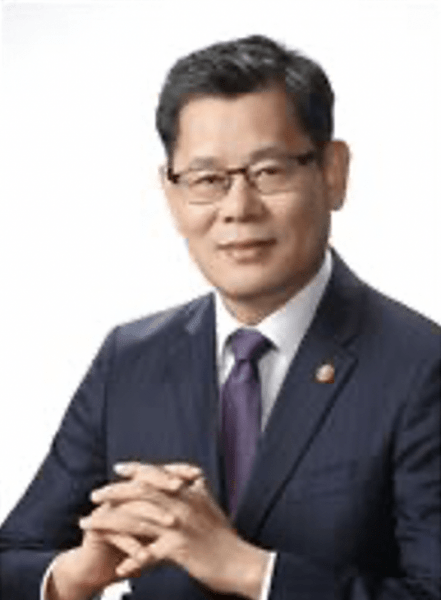 Yeon-Chul Kim is the Chairman of the Board of the Korea Peace Forum and a Professor of the Department of Korea Unification at Inje University. He served as the Republic of Korea’s Minister of Unification. Prior to that, he was the President of the Korea Institute for National Unification and served as a policy advisor to Minister of Unification. He worked as a Chief Researcher at Samsung Economic Research Institute and a research professor at the Asiatic Research Institute (ARI), Korea University. He is the author of Dialogue of the Past 70 Years: Re-evaluating the History of Inter-Korean Relations and The Strategy of Negotiation. He received his Ph.D. in Political Science from Sungkyunkwan University.
Yeon-Chul Kim is the Chairman of the Board of the Korea Peace Forum and a Professor of the Department of Korea Unification at Inje University. He served as the Republic of Korea’s Minister of Unification. Prior to that, he was the President of the Korea Institute for National Unification and served as a policy advisor to Minister of Unification. He worked as a Chief Researcher at Samsung Economic Research Institute and a research professor at the Asiatic Research Institute (ARI), Korea University. He is the author of Dialogue of the Past 70 Years: Re-evaluating the History of Inter-Korean Relations and The Strategy of Negotiation. He received his Ph.D. in Political Science from Sungkyunkwan University.
Moderator
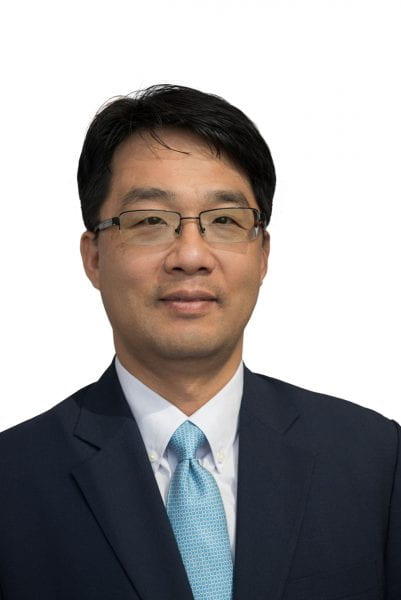 Yonho Kim is an Associate Research Professor of Practice and the Associate Director of GW Institute for Korean Studies. He specializes in North Korea’s mobile telecommunications and U.S. policy towards North Korea. Kim is the author of North Korean Phone Money: Airtime Transfers as a Precursor to Mobile Payment System (2020), North Korea’s Mobile Telecommunications and Private Transportation Services in the Kim Jong-un Era (2019) and Cell Phones in North Korea: Has North Korea Entered the Telecommunications Revolution? (2014). His research findings were covered by various media outlets, including Wall Street Journal, The Atlantic, Yonhap News, and Libération. Prior to joining GWIKS, he extensively interacted with the Washington policy circle on the Korean peninsula as Senior Researcher of the U.S.-Korea Institute at Johns Hopkins University School of Advanced International Studies, Senior Reporter for Voice of America’s Korean Service, and Assistant Director of the Atlantic Council’s Program on Korea in Transition. He holds a B.A. and M.A. in International Relations from Seoul National University, and an M.A. in International Relations and International Economics from Johns Hopkins University School of Advanced International Studies.
Yonho Kim is an Associate Research Professor of Practice and the Associate Director of GW Institute for Korean Studies. He specializes in North Korea’s mobile telecommunications and U.S. policy towards North Korea. Kim is the author of North Korean Phone Money: Airtime Transfers as a Precursor to Mobile Payment System (2020), North Korea’s Mobile Telecommunications and Private Transportation Services in the Kim Jong-un Era (2019) and Cell Phones in North Korea: Has North Korea Entered the Telecommunications Revolution? (2014). His research findings were covered by various media outlets, including Wall Street Journal, The Atlantic, Yonhap News, and Libération. Prior to joining GWIKS, he extensively interacted with the Washington policy circle on the Korean peninsula as Senior Researcher of the U.S.-Korea Institute at Johns Hopkins University School of Advanced International Studies, Senior Reporter for Voice of America’s Korean Service, and Assistant Director of the Atlantic Council’s Program on Korea in Transition. He holds a B.A. and M.A. in International Relations from Seoul National University, and an M.A. in International Relations and International Economics from Johns Hopkins University School of Advanced International Studies.
